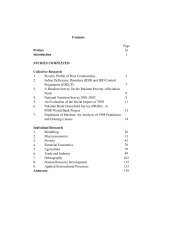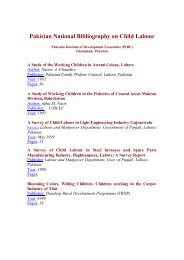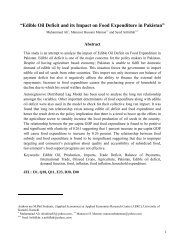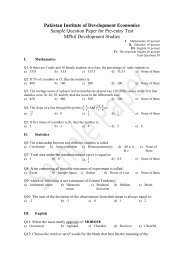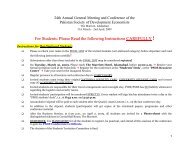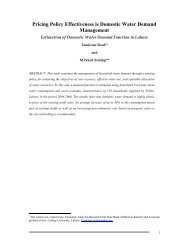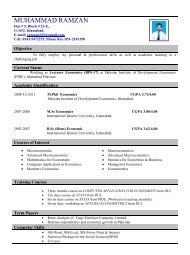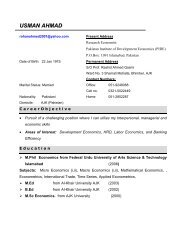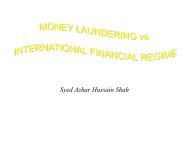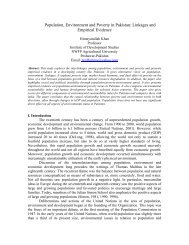Macroeconomic Factors and Equity Prices - Pakistan Institute of ...
Macroeconomic Factors and Equity Prices - Pakistan Institute of ...
Macroeconomic Factors and Equity Prices - Pakistan Institute of ...
Create successful ePaper yourself
Turn your PDF publications into a flip-book with our unique Google optimized e-Paper software.
5. Conclusion<br />
This study examine the relationship among the inflation, industrial production, oil prices, short<br />
term interest rate, exchange rates, foreign portfolio investment, money supply <strong>and</strong> equity prices<br />
for the period 6/98 to 6/2008 by using autoregressive distributed lag approach based on bounds<br />
testing procedure proposed by Pesaran <strong>and</strong> Shin(2001). Autoregressive distributed lag approach<br />
has been applied it more powerful procedure to explore the long run relationship as well short<br />
term dynamics <strong>of</strong> relationship <strong>and</strong> yields consistent estimates <strong>of</strong> the long-run coefficients that<br />
are asymptotically normal irrespective <strong>of</strong> whether the underlying regressors are I(0) or I(1). Data<br />
has been tested to examine econometric problems like serial correlation, functional form,<br />
normality, heteroscdasticity <strong>and</strong> unit root by using LM test, Ramsey Reset test, skewness <strong>and</strong><br />
kurtosis test ,white test <strong>and</strong> ADF Test <strong>and</strong> Phillip Parren Test respectively. Results indicate that<br />
econometric problems like autocorrelation, conflict to normal distribution has not been observed.<br />
Similarly, no model specification error exists with reference to Functional form. Unit root test<br />
clearly indicate that the index series are not stationary at level but the first differences <strong>of</strong> the<br />
logarithmic transformations <strong>of</strong> the series are stationary However, white test indicates the presence<br />
<strong>of</strong> heteroscedisticity. Shrestha(2005) states that presence <strong>of</strong> hetero-scedisticity does not effect the<br />
estimates so in ARDL we deal with data series which may not be integrated at same level so<br />
detection <strong>of</strong> heteroscedisticity it is quite natural..<br />
Results <strong>of</strong> ARDL long run coefficients reveal that Industrial production, oil prices <strong>and</strong> inflation<br />
are not statistically significant in determining equity prices in long run while interest rates,<br />
exchange rates <strong>and</strong> money supply have significant long run effect on equity prices. The error<br />
correction model based upon ARDL approach captures the short term dynamics <strong>of</strong> prices <strong>and</strong> it<br />
also confirms that changes in industrial production, oil prices <strong>and</strong> inflation are not statistically<br />
significantly in short run while changes in interest rates, exchange rates, <strong>and</strong> money supply have<br />
significant short term effect. However, Foreign portfolio investment has significant short term<br />
effect in short term <strong>and</strong> no long term effect in long term. The error correction variable ECM (-1)<br />
has been found negative <strong>and</strong> statistically significant The Coefficient <strong>of</strong> the ECM term suggests<br />
that adjustment process is quite fast <strong>and</strong> 39% <strong>of</strong> the previous year’s disequilibrium in equity<br />
prices from its equilibrium path will be corrected in the current year. CUSUM <strong>and</strong> CUSUMSQ<br />
plots are drawn to check the stability <strong>of</strong> short run <strong>and</strong> long run coefficients in the ARDL error





